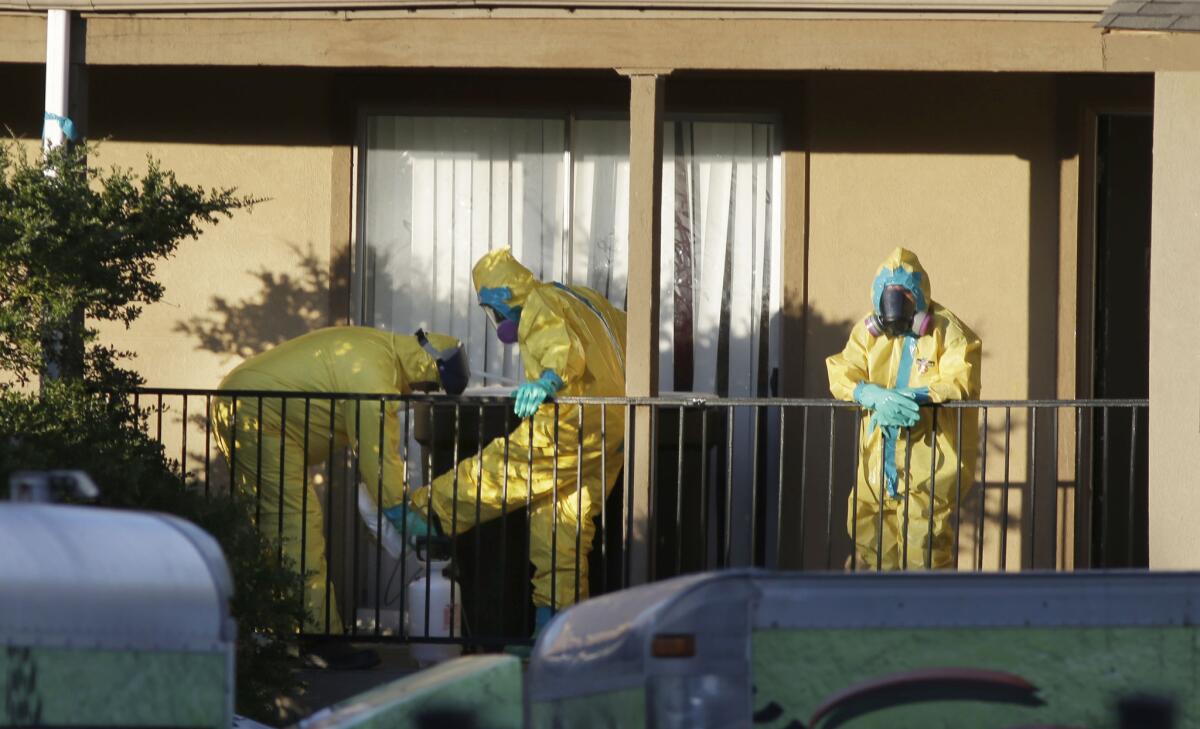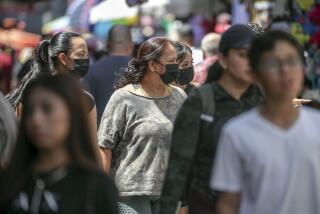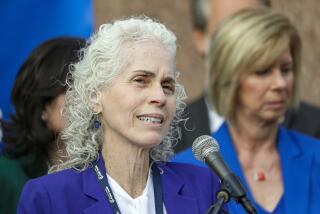What Ebola taught Dallas about fear in the age of coronavirus

- Share via
HOUSTON — Youngor Jallah was quarantined with her family of five, unable to work and stigmatized because she had cared for a relative before he died of a deadly virus.
That was six years ago, when the first U.S. Ebola case was diagnosed in Dallas. But the stigma continued even after Jallah emerged from voluntary quarantine.
“On the bus,” she recalls, “they were calling my children ‘Ebola children.’”
Dallas emerged from the Ebola scare with only one death, that first patient, and those close to the case now say they learned that fighting outbreaks like that of the coronavirus means combating fear as well as disease.
Texas’ Republican Gov. Greg Abbott has urged residents against hoarding and fear during the COVID-19 pandemic.
“We made it through Ebola, we made it through H1N1 and we’re going to make it through this,” Abbott said.
Dallas officials made similar assurances even as they declared a public health emergency March 13 and ordered residents Sunday to stay home.
“What we need to do as a state and a nation is to follow the science. And the only way to do it is to stay calm,” said Clay Jenkins, the chief executive of Dallas County who has held office since 2011, before Ebola hit Dallas.
That outbreak began when Thomas Duncan, the fiance of Jallah’s mother who was visiting Dallas from Liberia, sought treatment at a local hospital. Within a week, he died. Soon after, two nurses who had cared for Duncan were also diagnosed with Ebola. Both were treated and quarantined, and they survived.
Jallah’s mother, Louise Troh, her then-13-year-old son and two older nephews were exposed and asked to stay home. Fear of the local West African community began to mount.
“They said African people are dumb. We are not dumb. We are real people,” Troh said in a recent phone interview.
Cashiers in her neighborhood started wearing latex gloves. Parents expressed fear of sending their children to school. Crowds formed outside the apartment complex where she lived.
Officials ultimately forced 43 people, including Troh’s family, to remain quarantined for a month.
Troh and her relatives were moved to a house provided by the Catholic diocese, their apartment decontaminated by industrial cleaners, their furniture and belongings destroyed to prevent the disease’s spread.
“I lost all my items, and I was thinking I was going to lose my kids,” she said.
What reassured her and many others was seeing Jenkins visit the family without a hazmat suit, first at their apartment, then at the house where they were later quarantined.
Jenkins said he helped Troh’s family move “out of necessity.”
“No one else would do it,” he said by phone. “It had the benefit that I did not recognize at the time of calming the public and sending a message to people of acceptance of their fellow person.”
Troh, 59, and her family were eventually declared Ebola-free, released from quarantine and stayed in Dallas. Duncan is the only person diagnosed with Ebola in the U.S. who died.
When news of the coronavirus broke, Troh got upset. But after calling Jenkins, she said, she felt relieved.
“This is a whole different story” from Ebola, she said. “People should not panic. Keep clean. Wash your hands.”
Coronavirus and Ebola are both scary from a medical standpoint, but for different reasons.
The two have some of the same initial symptoms, but Ebola often causes dramatic bleeding and has an average fatality rate of 50%, far higher than the coronavirus has had thus far, according to the Centers for Disease Control and Prevention.
And in the U.S. right now, the coronavirus is easier to catch.
As the virus spread to Texas, Jenkins acknowledged that the xenophobia Dallas experienced during the Ebola scare has surfaced again, this time against members of Asian and Asian American communities.
He said he has tried to emphasize, as he did during the Ebola outbreak, that although the disease may have arrived from overseas, community members need to work together to prevent it from spreading locally. He noted that in the last week, Dallas and other Texas cities reported their first cases of the coronavirus being spread through the community, not via travelers from overseas.
“Xenophobia about people who look a certain way or have traveled to a certain country is no longer relevant when you have community spread,” Jenkins said.
So far, 627 people have tested positive for the coronavirus in Texas, including at least 131 in Dallas County, which has had three deaths — two of them reported Sunday.
Jenkins held a briefing Sunday — just as he had daily during the Ebola outbreak — to issue the stay-at-home order after conferring with local doctors and hospital leaders. Before declaring an emergency and banning meetings of 500 or more people March 13, he met with leaders of local cities, houses of worship and businesses to allay their fears.
Former Dallas Mayor Mike Rawlings recalled that during the prior crisis, he and Jenkins were careful to offer as many facts as they could — and to also admit what they didn’t know.
“The public can’t be tricked,” said Rawlings, a former Pizza Hut chief executive. “The way I dealt with it was giving them more information versus less, and that worked.”
“I’m concerned [that] with this there’s going to be a lot of pain and deaths,” said Rawlings, emphasizing that expanded testing is critical.
“The key is to keep this as short as we can and keep the infections as low as we can,” Rawlings said.
Rawlings never declared a health emergency or limited public gatherings during the Ebola outbreak, as Jenkins and the current mayor did for the coronavirus, and it was ultimately contained. But the U.S. is beyond containing the coronavirus, Rawlings said, and such drastic steps are worth the risk to mitigate the virus’ reach.
Dr. Daniel Varga, former chief clinical officer of Texas Health Resources, which includes the hospital where the Ebola crisis unfolded, has since moved to New Jersey, where he serves as chief physician executive at Hackensack Meridian Health. He is now responding there to the coronavirus.
In both outbreaks, Varga said, “healthcare providers are on the front line and they’re at risk. If you’re going to treat it and stem the tide, people have to step into the breach. It takes really brave people to do that.”
He said hospitals have to not only provide training and protective equipment to ease concerns among those on the front lines but also add staffing and support.
Varga said public fears are also stoked by the lack of testing and accurate measures of how fast the virus is spreading.
“We have to be honest right now, we’ve been living in a world of [coronavirus] testing deficits,” he said. “We’ve had folks who wanted to get tested and we’ve let them know we have a queue of people in the ER in isolation rooms who we still don’t have tests for.”
During the Ebola outbreak, the hospital Varga oversaw was criticized first for misdiagnosing Duncan, which delayed his care and placed others at risk, and later for safety failures that led the two nurses to become infected. It became, he acknowledged, “the Ebola hospital.”
“It took the hospital a long time to bounce back from that,” he said.
Jallah also tired of living with the Ebola stigma in Dallas. She had stayed because her husband didn’t want to move. But last year, she found a job in Iowa and moved with her children, leaving their father behind.
She settled in Cedar Rapids with children Rose, 11; King, 9; and Prophet, 7.
Jallah works at a nursing home, and didn’t tell coworkers about her Ebola ordeal until after they noticed her becoming preoccupied with news of the coronavirus.
“We are doing all precautions, using hand sanitizer, hand washing. We’re just very careful,” she said of her family.
She tries not to worry. But each day when she reports to work, her temperature is taken, along with those of her coworkers, as a precaution against the disease.
“Anybody can have it, you don’t know,” she said.
More to Read
Sign up for Essential California
The most important California stories and recommendations in your inbox every morning.
You may occasionally receive promotional content from the Los Angeles Times.











